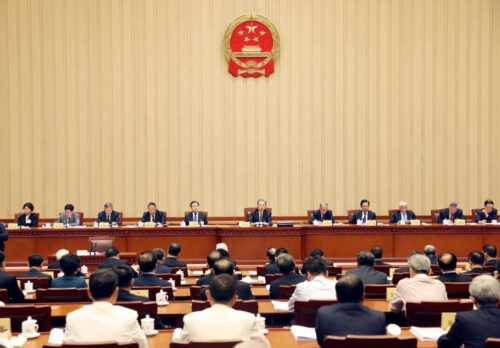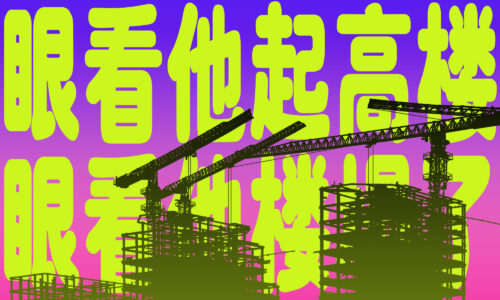We need to talk about Country Garden
Real estate giant Country Garden is on the brink of default and is fighting off rumors its executives fled China. Here’s how the property giant fell, and why it matters.

HONG KONG — Country Garden’s former office branch was in Wing On Centre, a faded mall on Nathan Road, the main transportation artery running down the Kowloon Peninsula. On October 10, the 9th floor office’s interior was in the process of being demolished. A contractor was blaring mandopop as he wielded a sledgehammer among the bare cinder block walls and gutted ceilings.
“I just got here,” he said. “I don’t know when they moved out.”

A major factor in the economic pall hanging over mainland China is the bursting of a property bubble. With some limited interruptions, over the past twenty years there has been a widespread belief that property prices “only go up.” As with all economic impossibilities, it was only a matter of time before this assumption was proven wrong.
Along with Evergrande, no other company better embodied the heady go-go years of China’s real estate market than Country Garden. Both companies could credibly claim to be the biggest developers in China at various times during the last three decades, but they both owe their gargantuan size to gargantuan levels of debt.
China’s bubble in asset prices was driven by distorted incentives around both the supply and demand of housing.
On the supply side, local governments were incentivised to sell as much land to developers as possible, as this is one of their primary sources of revenue (most taxes are collected by the central government).
On the demand side, the market is prone to such bubbles because there are few other investment options in China — interest rates on savings accounts are kept artificially low to make financing for businesses more affordable, capital controls make it difficult to invest money outside the country, and China’s volatile stock market does not reassure conservative savers. With property one of the few viable options, investors piled in, which caused prices to rise, which caused more investors to pile in, leading to unsustainable increases in prices. In addition, real estate companies took on a lot of debt in order to grow faster than their competitors.
So there was a mad rush among households, businesses, and local governments to make money. As with all asset bubbles, it had to burst, and now the question is who should bear most of the costs.
Nowadays, if you look up “Country Garden” (碧桂园 bì guì yuán) on China’s equivalent of Instagram, Little Red Book (小红书 xiǎo hóng shū), you will find stories of the real estate company’s employees being fired and not receiving severance, homebuyers reviewing their freshly delivered flats (some glowing; many reproachful), and posts exhorting people to “support Country Garden” by buying their apartments.
These are all signs of the massive cash flow problem besetting what was once China’s largest property developer by sales.
Adding to Country Garden’s woes are rumors that the company’s founder Yeung Kwok Keung (杨国强 Yáng Guóqiáng) and his daughter Yáng Huìyán 杨惠妍 — the company’s current chairwoman — have fled China (which the company denied this week), and reports that it is defaulting on its overseas debt after it missed $15 million coupon payment. The company has about $11 billion in offshore debt, and it is believed to have another $6 billion in onshore loans.
A slowdown, not a crisis?
Evergrande grabbed headlines when it defaulted on offshore bond payments in 2021, but Country Garden is arguably more important for China’s broad middle class because it has far more unfinished projects that have already been sold to impatient citizens. A Nomura report from August of this year said that Country Garden has about 1 million unfinished homes and 3,312 projects under construction.

Although China’s real estate slowdown will hurt economic growth, none of the analysts and investors interviewed by The China Project believe it is a source of systemic risk comparable to the bank failures of the Great Financial Crisis. They all more or less agreed with the view forwarded by investor Louis-Vincent Gave in an opinion piece for the Financial Times from late August 2023, which noted Chinese sovereign debt and bank shares outperformed their American counterparts over the previous 12 months — hardly an indication of China’s impending economic collapse, despite recent headlines to the contrary.
In fact, China’s current economic slowdown is largely self-induced. Peter Churchouse, the managing director of real estate investment firm Portwood Company and former chairman of the economic policy committee for the Hong Kong General Chamber of Commerce, notes that Country Garden’s current struggles are a consequence of the three red lines policy instituted in 2020. “Country Garden’s situation is a symptom and result of what the macro policy is,” he said.
Churchouse believes the overall priority of the government is to shrink the role of real estate in China’s economy. “The government is not going to come out and bail out the developers in a big way,” he said. “The priority to fix them is not as great as the priority to diversify the economy.” Sectors such as high-end manufacturing of EVs, semiconductors, and renewable energy appear to be where the government wants to see growth.
China’s economic growth has been dependent on infrastructure and real estate investment for decades. The last property slow-down occurred in 2014–2015. In response to that bear market, which threatened the government’s target of 7% GDP growth for 2015, authorities unleashed a ten trillion yuan infrastructure stimulus package along with programmes like “shanty town redevelopment” in subsequent years. By the spring of 2017 China’s economy was humming again, spurred on by what at the time Reuters described as a “gravity-defying property boom.”
Much of that growth occurred in lower-tier cities, and Country Garden led the charge. In its 2016 annual report, its founder and then-chairman Yeung Kwok Keung boasted that “In 2016, China’s property market was booming in contrast with oversea [sic] observers’ reservations about the market. By the same token, Country Garden was making bold strides while most of its peers were trying cautiously to follow suit.”
Indeed. In 2016, 41% of its annual sales came from tier 3 and tier 4 cities (page 14 of annual statement). By 2017 it was up to 50% (page 6 of annual statement) and by 2019 it was 56% of total sales (page 18 of annual report). Revenue from contracted sales in tier 3 and 4 cities grew from 96.3 billion yuan ($13.16 billion) in 2016 to 309.2 billion yuan ($42.26 billion) in 2019. This made for a compound annual growth rate, or CAGR, of 48%, well ahead of the overall contracted sales growth CAGR of 33%.
Country Garden did not respond to requests for comment.

An analyst from Mainland China who wished to remain anonymous told The China Project that smaller cities saw a property “bull cycle” from 2015–-2020, which ended when the government set strict limits on the amount of debt property developers could take on (“the three red lines policy”). The analyst’s relatively small hometown was one of many places that saw rapid urbanization and speculative homebuying over this period.
However, the analyst said that lower tier city home prices have already declined 40% from their peak in 2019. This decline in asset prices among regular citizens is one of the key sources of concern for foreign investors, who fret about the negative wealth effect of such a dramatic drop in housing prices.
On top of falling home prices hurting consumer sentiment, in the wake of the pandemic, regular Chinese people saw reduced incomes. Eileen, an employee at Longfor’s commercial real estate division in Chongqing who declined to give her full name, said she had noted a marked “consumption downgrade” in the years following COVID. The average price per unit of goods sold in their malls remains below pre-pandemic levels.
Of the mall’s customers, she said, “They just come hang out. They don’t want to shop.” This sense of an illusory busyness in Mainland commerce was widespread among P.R.C. citizens interviewed by The China Project.
The anonymous analyst believes the government will prevent a further decline in home values. “If property prices decline more, people will stop paying mortgages…There would be social instability,” the analyst said.
Overseas bondholders to take a haircut
The other potential source of instability is if pre-sold flats are not delivered to homebuyers. “If those projects don’t get completed there is likely to be significant protests,” Churchouse said. As a result, developers like Country Garden are prioritizing finishing building properties over interest payments on bonds and other debt repayments. Its September HKEX filing mentions ensuring deliveries is its top priority three times in the space of one paragraph.
In the U.S., bond holders are “first in line” in the event a company is liquidated. But bondholders — particularly offshore bondholders — of struggling Chinese developers are unlikely to be made whole. Therefore, offshore corporate bonds of companies such as Country Garden have been trading for cents on the dollar even before the recent news of its failure to repay the interest on a dollar-denominated loan. Longer term, this current situation may impact overseas financing options for Chinese corporations.
One result of greater uncertainty is that state-owned developers have benefitted. Tracy Feng is an employee at a mid-sized state-owned property developer based in Guangzhou. Although the property market ructions of the past three years have also hit demand for her company’s properties, longer term she is cautiously optimistic. “There will be no unfinished buildings among state-owned enterprises,” she said. As a result, homebuyers are more attracted to projects such as those offered by her company. The flip-side of this is cash-flow for private developers like Country Garden is being further impacted as their sales slide faster than the overall market downturn.
Despite the challenges presented by the property slow-down, the chances of a bail-out akin to what happened in the U.S. following the Great Financial Crisis are low. Chris Wood, the Global Head of Equity Strategy at Jefferies, does not expect a “bazooka” stimulus for the property sector. He is looking at the next three months as a critical period for assessing whether consumer confidence and housing demand in China can stabilize at more sustainable levels. “In the past,” Wood said, “policy drove the cycles.” The question now is whether potential homebuyers will respond to the latest round of policy easing that has included reduced down payment requirements, mortgage rates, and purchasing restrictions.
Back in Hong Kong, as The China Project left the former office of Country Garden the doorman spoke up. “They moved out a week or two ago,” he said with a smile. “They’re having some problems. Weren’t you here yesterday?”
I told him I was not.
“Someone just like you came by.”
“What, a foreigner?”
“Yeah. Someone just like you was here yesterday trying to talk to them.”
I thanked the man and walked out onto Nathan Road. Cars zoomed by, the sky was gray, and I reflected that someone, somewhere, had lost a lot of money.






